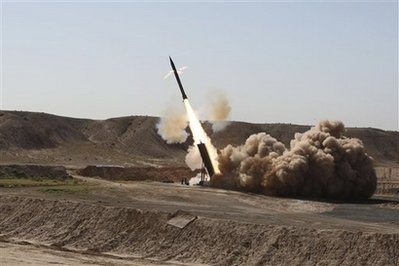Iran has developed a second rocket-launching facility which will likely be used to test ballistic missiles, a London-based defence analysis group said Thursday.
IHS Jane’s said it had pinpointed the site outside the city of Shahrud, around 350 kilometres (220 miles) east of Tehran, near the Caspian Sea and the Turkmenistan border.
By analysing satellite imagery, Jane’s said that construction began at the site between May and September 2010 — around the same time as the expansion of Iran’s existing launchpad in Semnan.
Iran’s missile programme, along with its space projects, has been a mounting source of concern in the West.
Western governments fear Tehran is developing a ballistic capability to enable it to launch atomic warheads which they suspect Iran is seeking to develop under cover of its civil nuclear programme.
Tehran denies any such ambition.
“Satellite imagery analysed by IHS Jane’s has revealed a previously undisclosed Iranian rocket launching facility near the city of Shahrud in northeastern Iran,” said Matthew Clements, editor at IHS Jane’s Military and Security Assessments Centre.
“This is the second known facility in Iran that will have the capacity to launch satellites into space, and plans for a third have been announced,” Clements said.
“Imagery analysis of the Shahrud site suggests it will be a strategic facility used to test ballistic missiles, leaving the other two sites free to handle Iran’s ambitious programme of satellite launches.”
The site is around 40 kilometres (25 miles) southeast of Shahrud.
By August 2011, a major construction project was under way, covering approximately 100 square kilometres (40 square miles), Jane’s said.
The facility has “several primary functional areas: administration and support; horizontal processing where rockets are prepared for launch; launch pad; and an underground facility connected to the site by a new road and an underground cable,” said Jane’s.
The latest images from July 6 this year show Iran has made significant progress, the group said.
“Ground scarring and road network construction throughout the facility strongly suggest that this is only the first phase of a significantly more ambitious construction plan.”










